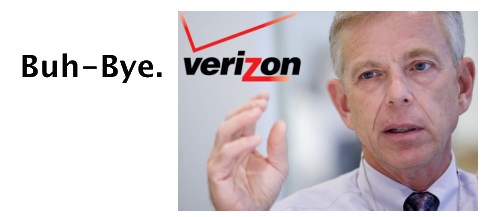
Verizon’s FiOS expansion is still as dead as Francisco Franco.
Verizon is prepared to watch up to 30% of their copper landline customers drift away because the company is adamant about no further expansion of its FiOS fiber to the home network.
Fran Shammo, chief financial officer at Verizon, told attendees of the Jefferies Global Technology, Media & Telecom Conference that Verizon will complete the buildout of its fiber network to a total of about 19 million homes, and that is it.
“Look, we will continue to fulfill our FiOS license franchise agreements,” Frammo said. “[We will] cover about 70% of our legacy footprint. So 30%, we are not going to cover. That is where we are still going to have copper.”
That is bad news for Verizon customers stuck with the company’s copper network because Verizon isn’t planning any further significant investments in it.
“We will continue to harvest that copper network and those customers and keep them as long as we can,” Frammo said. “But we will not be building FiOS out for those areas.”
In fact, Frammo admitted ongoing cost-cutting at Verizon’s landline division is allowing the company to shift more money and resources to its more profitable wireless network.

Verizon CEO Lowell McAdam doesn’t want to spend money on non-FiOS areas when more can be made from its wireless network.
“It is also taking cost structure out,” Frammo said. “As I mentioned, the migration of copper to fiber has been very big for us. Our Lean Six Sigma projects have really significantly helped us in our capital investment in the wireline which is why I can put more money into the wireless side of the business.”
Verizon has shifted an increasing proportion of its capital investments towards its wireless division year after year, while cutting ongoing investment in wireline. Ratepayers are not benefiting from this arrangement, and critics contend Verizon landline customers are effectively subsidizing Verizon’s wireless networks.
Verizon will still complete the FiOS buildouts it committed to earlier, particularly in New York City, but it is increasingly unlikely Verizon will ever start another wave of fiber upgrades.
In fact, Michael McCormack, the Jefferies’ Wall Street analyst questioning Shammo at the conference foreshadowed what is more likely to happen to Verizon’s legacy copper customers.
“We have talked extensively in the past about the non-FiOS areas and I guess in my second reincarnation as a banker, I will try to help you get rid of those assets,” said McCormack.


 Subscribe
Subscribe
It is Verizon’s stupid decision to cut more jobs and eventually get out of internet business. You need to give your customers advanced, built-in WiFi AC gateway with 2.4 Gbits per second WiFi speed. I support dual band WiFi with 1.2 Gbits + 1.2 Gbits which makes it even more attractable for customers to go with FiOS and it beats cable internet modems. You also have to give customers free internet speed upgrades automatically than ever before along with new Speed WiFi Modem based on 100% all fibre network. You also have to make FiOS TV more attractive to modern… Read more »
As long as people are willing to pay $125-200+/mo for their 4G Smart Phone cellular plans giving Verizon and AT&T a 90%+ gross profit on metered data NEITHER of those companies are going to make a serious effort to invest or build out their landline broadband service, such as Verizon who has made it clear they will NOT do any further buildout besides what they committed to as long as they’re able to re-invest those profits into the more lucrative cellular side of the business. You’re really wasting your time demanding improvements like that, as the companies that own the… Read more »
The cell companies really push the data plan whenever someone buys a smartphone. Many customers would be better off going per-minute (Pay As You Go) instead of monthly payments. Some MVNOs accommodate this, but CDMA carries like Verizon make it rather difficult to get a cheap smartphone on their MVNOs (requiring the customer to wait months before it’s “cleared”, if at all). The MVNO model convinces me that the same thing could work for land lines. The virtual networks sell the service to consumers while other companies provide the physical network. This should provide some much needed vertical separation and… Read more »
You also wouldn’t have a single company monopolizing PRIME resources such as the spectrum that Verizon occupies with the best penetration of building in dense metro areas. A public resource like our airwaves should be available to any company to provide services over just as you mentioned with the MVNO providers which I’ve found extremely competitive even when they’re buying from ATT/Verizon and selling at half the cost direct to consumers. The only problem most of the MVNO’s have had is they’re beholden to contracts and price agreements with the same companies they’re competing against, so at anytime they could… Read more »